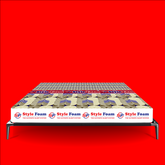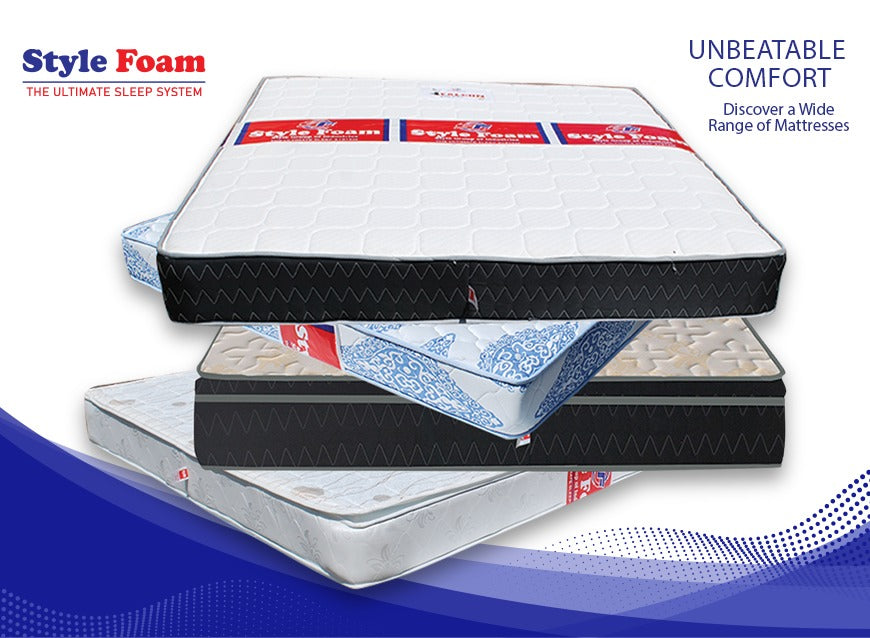When was the last time you woke up feeling truly rested? If it’s been a while, your mattress might be to blame. Many people underestimate the powerful role a mattress plays in their health and well-being. It’s not just about comfort — the right mattress supports your spine, aligns your body, reduces pressure points, and promotes uninterrupted sleep.
In this comprehensive guide, we’ll explore why the mattress you sleep on matters, how to choose the perfect one, and what to avoid. Whether you’re shopping for your first high-quality mattress or upgrading after years on an uncomfortable bed, you’re in the right place.
Why Your Mattress Matters More Than You Think
Sleep is when your body recovers, your brain processes memories, and your muscles and tissues repair themselves. A poor-quality mattress can disrupt all of that. Here’s how the right mattress can make a difference:
1. Spinal Alignment
A mattress should support the natural curve of your spine. If it’s too soft or too firm, it can cause misalignment, leading to back and neck pain.
2. Pressure Relief
Good mattresses distribute your weight evenly, reducing pressure on sensitive areas like your hips, shoulders, and lower back.
3. Reduced Motion Transfer
If you sleep with a partner, a high-quality mattress will absorb motion, so you’re not disturbed every time they shift in the night.
4. Temperature Regulation
Some mattresses retain heat, while others help keep you cool. Choosing the right material makes all the difference in temperature control.
5. Allergy Resistance
Hypoallergenic mattresses resist dust mites, mold, and bacteria — all common triggers for allergies and respiratory issues.
Types of Mattresses: Which One Is Right for You?
There’s no one-size-fits-all when it comes to mattresses. Your ideal choice depends on how you sleep, your body type, health conditions, and personal preferences.
1. Memory Foam Mattresses
Known for contouring and pressure relief, memory foam molds to your body shape. It's great for people with back pain or joint issues. However, it can retain heat unless it’s infused with cooling gel.
Best For: Side sleepers, couples, and people with chronic pain.
2. Innerspring Mattresses
These traditional mattresses use coils for support. They offer strong bounce and breathability but may not contour as well as foam.
Best For: Back or stomach sleepers who like a firmer feel.
3. Hybrid Mattresses
A combination of memory foam and innerspring, hybrid mattresses offer both support and contouring. They’re a popular choice for those wanting the best of both worlds.
Best For: Combination sleepers or couples with different sleep styles.
4. Latex Mattresses
Made from natural or synthetic rubber, latex is durable, supportive, and more eco-friendly. It sleeps cooler than foam and has a responsive, bouncy feel.
Best For: Eco-conscious consumers and people who want a cooler, firmer surface.
5. Airbeds and Adjustable Mattresses
These mattresses let you adjust firmness levels using air chambers or mechanical systems — ideal for people with medical needs or couples with differing preferences.
Best For: Those who want customizable firmness or suffer from specific medical conditions.
How to Choose the Right Mattress for Your Sleep Style
Your preferred sleeping position should guide your mattress choice:
1. Side Sleepers
You need pressure relief at the shoulders and hips. Medium-soft to medium-firm memory foam or hybrid mattresses usually work best.
2. Back Sleepers
You need support for the lower back and spine. A medium-firm to firm mattress provides optimal alignment.
3. Stomach Sleepers
A firmer surface is crucial to prevent the midsection from sinking too deep and straining the spine.
4. Combination Sleepers
Choose a responsive mattress that adjusts quickly to movement — hybrids or latex mattresses are excellent options.
Common Mattress Shopping Mistakes to Avoid
Even with all this information, it’s easy to make mistakes. Here are some of the biggest ones to avoid:
❌ Buying Based on Firmness Alone
Firmness is subjective and varies by brand. Always check for firmness and support.
❌ Not Testing Before Buying
If you're shopping in-store, lie down in your normal sleeping position for at least 10 minutes. If buying online, make sure there’s a generous return policy.
❌ Ignoring Sleep Trials
Many online mattress brands offer 90–365 night sleep trials. This is essential because it takes time for your body to adjust to a new mattress.
❌ Skipping the Warranty
A good mattress should come with a minimum 10-year warranty. Avoid brands that don’t stand behind their product.
❌ Forgetting About the Base
The wrong bed frame or foundation can undermine your mattress’s performance and shorten its lifespan.
Mattress Lifespan: When Should You Replace Yours?
Even the best mattresses wear out over time. On average, a mattress should be replaced every 7 to 10 years. Here are some signs it’s time:
-
You wake up with aches or pains
-
The mattress is sagging or has indentations
-
You sleep better in other beds (like hotels)
-
You experience more allergies or asthma symptoms
If any of these sound familiar, it may be time to upgrade.
Mattress Care Tips: Make Yours Last Longer
Once you invest in a quality mattress, take care of it to extend its life:
-
Rotate it every 3–6 months to prevent uneven wear.
-
Use a mattress protector to guard against spills, dust, and allergens.
-
Vacuum your mattress every few months to reduce dust mites.
-
Let it breathe occasionally by removing the sheets and exposing it to air.
-
Follow the manufacturer's guidelines for cleaning and maintenance.
Final Thoughts: Invest in the Sleep You Deserve
A mattress isn’t just a piece of furniture — it’s the foundation of your physical and mental health. You spend roughly one-third of your life sleeping, so don’t settle for a subpar surface. Whether you’re a back sleeper, side snuggler, or a restless tosser, there’s a perfect mattress out there for you.
If better sleep, improved energy, and reduced pain sound good to you, it all starts with the right mattress.
Bonus: Mattress FAQs
Q: How much should I spend on a mattress?
A quality mattress usually ranges from $500 to $2,500, depending on the materials and brand. Think of it as an investment in your health.
Q: Do I need a box spring?
Not always. Some modern mattresses work better with a solid foundation or adjustable base. Check the manufacturer’s recommendation.
Q: How long should I try a mattress before deciding?
Give it at least 30 days. Your body needs time to adjust to a new sleeping surface.
Q: Can a mattress help with back pain?
Yes! A medium-firm mattress that supports your spine and relieves pressure points can significantly reduce back pain.












